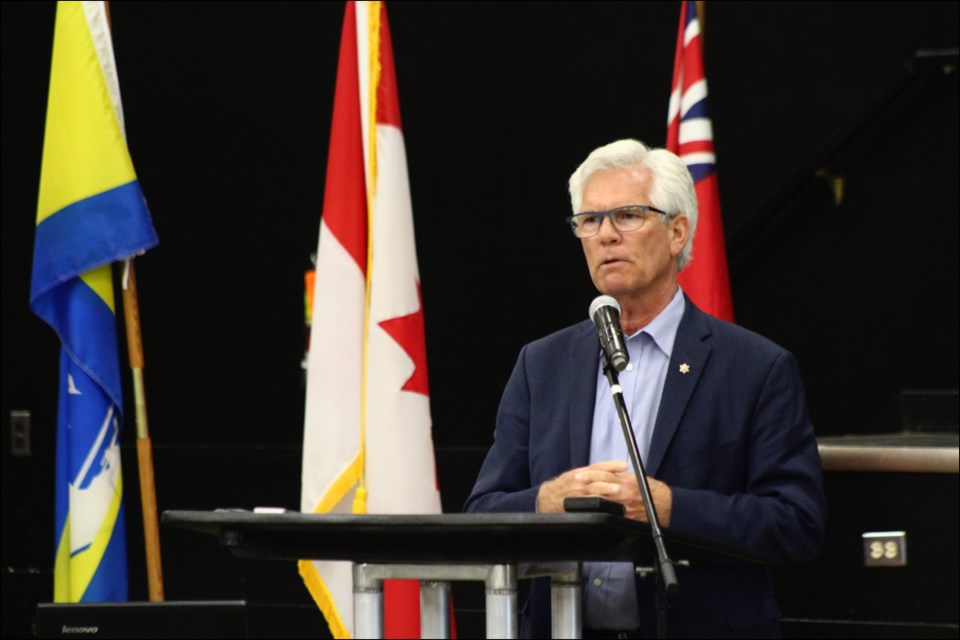Hope, change and making money – that was the general feeling of this year’s Hudson Bay Route Association (HBRA) annual meeting, held earlier this month in Flin Flon.
It was the first time in nearly 60 years the group, organized to advocate for the use of the Hudson Bay Railway and the Port of Churchill, had held their annual meeting in Flin Flon. The HBRA, flush with optimism after the railway’s purchase and reopening last year and the first grain shipment to Churchill earlier this summer, showed their positivity in the event’s name – “Back on Track.” Speakers and organizers preached a gospel of northern and regional economic gain that could come from extensive use of the railway and shipping facilities.
The event included both a question and answer session and keynote speech with Jim Carr, the federal Minister of International Trade Diversification. Carr was one of the key figures behind the federal funding for the railway last year.
“The world is going to need more and more of what we produce, right here in the prairies. It’s our challenge to find a way to get it to them. Without the Port of Churchill and without that line, we had no chance. Now, we are in the game and the stakes are high,” Carr said.
Carr also added that the ongoing global impact of climate change could have positive repercussions for northern trade, allowing new shipping lanes to open up and stretching the shipping season at Churchill.
“The impact of climate change is a double edged sword. The permafrost is melting, it's a problem, it's expensive to maintain the line - but the season is elongating every year,” he said.
“We’re investing in what makes us special.”
Organizers also held a roundtable discussion with Flin Flon Mayor Cal Huntley, Hudbay director of health, safety and Aboriginal and external affairs Richard Trudeau, Opaskwayak Cree Nation Onenakew Christian Sinclair, Churchill Mayor Mike Spence and Joe Coccimiglio with Fairfax Financial, one of the owners of the line.
“For this region, it’s very important that this portion of the rail line remain in place. It offers huge attraction for diversification, which is key to the future of this area. There's industries in northern Saskatchewan, being the mines or whatever that become way more interesting when they know we have rail service here,” said Huntley.
“For us, diversification is key. The idea of access of the port to the mining industry or any other industry is key.”
Mayor Spence said a recent trade trip to Nunavut encouraged residents in the territory to take advantage of the line and port.
“Even though the media has picked it up and said the port is up and running, people in Rankin Inlet have been asking us, ‘Is the port open? Are the trains running?’” he said.
“The trains have been moving since last December. Freight has been moving. We have lost a lot of time here, so there’s a lot of work that needs to be done.”
Sinclair said the increased investment and economic activity that comes with the restoration of the line would boost northern business.
“I like that this is going to be the backbone of northern Manitoba, if you will. This is the spine of logistics that will move a lot of major product outward bound, but also hopefully inward bound,” he said.
“This is a big investment. We have to look at what China's doing – they’re investing all over the world right now, building their ‘New Silk Road’ as they call it. We have, as I call it, the ‘Buckskin Road’ that starts in the traditional territory of Opasquia and goes to Churchill.”
As part of the purchase agreement reached last year, northern communities were offered shares in the ownership group for small fees. The City of Flin Flon was one of the communities that purchased shares last year. Huntley praised that idea, saying it allows the communities to have a further stake in the railway’s success.
“I think the way the structure was set up, with the communities having shares, that the communication between the working group and the communities will continue to get better. If there’s a need for the communities to lobby, then we certainly will.”
While having the line restored was a sign of hope for both northern leaders and southern farmers, some in attendance urged the group and leadership to continue work.
“This is the most vulnerable moment and likely the greatest opportunity for you. You want to have all of those political parties on the record and committed to a northern strategy. If you can't get them committed now, you're not going to get them committed after the election,” said Carr.
“You got a small window here. The window is open. Fly through it.”
“I think any time you have a railway that’s down for a few years, your customers have to find an alternative solution. Now we have to go back to them and win most customers back,” added Coccimiglio.
“We’re going up to Nunavut to tell people we have new owners and new way of doing business. We’re here and we want to do business with you and we want to build a long-term partnership.”




